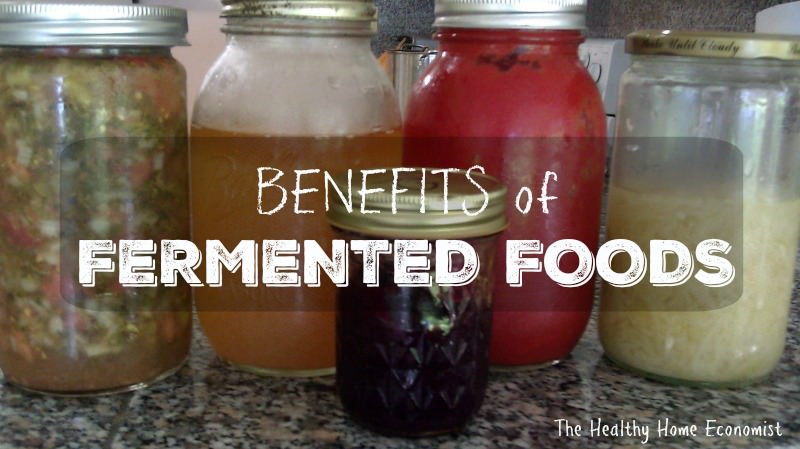
The benefits of fermented foods consumed on a regular basis are many. The principle is so fundamental to ancestral diets that over one-quarter of the 100+ videos on this site specifically address the topic of fermented foods and beverages.
The video below covers all the reasons why you should be fermenting foods and beverages in your home on a regular basis. This ancestral practice was key to the extraordinary health of indigenous cultures.
It’s key to your health as well.
If you are like most Westerners, the concept of home fermentation may seem a bit crazy at first. This is because it involves the cultivation of microbial life in your own kitchen!
How can this possibly be safe let alone beneficial to health?
You need to get over that feeling immediately if this is your mindset. Avoidance of all the microbes in nature will get you nothing but sick and riddled with autoimmune problems over time. For example, children who consume raw dairy (loaded with beneficial bacteria called probiotics), suffer from significantly fewer allergies and other autoimmunity issues than children who drink sterilized (pasteurized) milk. This is one of many examples of how beneficial microbes boost health.
Cultivation of well known fermented foods like yogurt, kefir, and sauerkraut encourages the same type of microbial life. There are so many more delicious options for fermented fruits, veggies, drinks, and even meat, dozens of which are covered on this blog. So even if you don’t drink raw milk, you can enjoy similar health benefits.
These microscopic creatures are, in fact, the ultimate gatekeepers of our health. There is no need to fear them. Consumption of fermented foods helps encourage these beneficial strains to flourish within our GI tract. Their presence strengthens our resistance to the occasional pathogens that cross our path.
Your Body is Crawling with Bacteria All the Time!
In short, being a germaphobe is a surefire way to put a pathogenic bacterial bulls-eye on your forehead.
I’m not in any way saying don’t wash your hands or maintain a clean atmosphere in your home!
I’m simply trying to drive home the point that bacteria, like everything else, come in a good and a bad variety. The good news is that most of them are good.
Home fermentation involves the cultivation of these many strains of good bacteria and yeasts, also called probiotics. When consumed, these foods will encourage your gut lining to be home to these amazing little critters. Some strains have the ability to aggressively fight and reduce levels of any pathogenic strains like candida that inappropriately reside there. Bad microbes typically gain ground in our digestive tract when antibiotics or other meds like the birth control pill are taken. A nutrient-poor diet high in processed foods high in refined flour and sugar cause imbalances too.
Without the beneficial guys to fight back, you are at the mercy of any pathogen that comes your way. Trying to avoid them by being addicted to hand sanitizer won’t work either.
Bacterial Cells Outnumber Human Cells
There are actually 10 times more bacterial cells in your body than human cells! Our skin and every tissue of the body is crawling with bacteria all the time. Of course, bacterial cells are much smaller than human cells, which is how this fact generally goes unnoticed.
Learning to cultivate the bacteria that are beneficial to your health by regularly eating fermented foods that encourage their growth is absolutely essential to keeping disease and infections at bay. It is also crucial to recovering quickly when you do fall ill.
Every tissue of your body both inside and out is going to be dominated by bacteria one way or the other.
The question is, do you want your body to be dominated by good bacteria or bad bacteria?
If you want it to be good bacteria, then Welcome to the Wild and Crazy World of Lacto-Fermentation! It’s a Fun Ride, so hop on board!
For a complete transcript of this fermented foods and beverages video, click here.
Sources
Humans Carry More Bacterial Cells Than Human Ones, Scientific American
The Microbiome Diet (book)








@Jenny you can always dilute if too strong.
Excellent! My first ginger ale batch was like fire water. I think there is a BIG difference between 3/4 cup of ginger, grated… and 3/4 cup of grated ginger! Sometimes less is more. 😉 Looking forward to trying that again. Also have some beets for kvass. Thanks for the inspiration!
I just started on the Fermentation wagon –let me just say I am having a BALL!! And your website is soooo awesome. Thank you and keep up the great articles!
Excellent video-thanks! I am going to try the ginger ale…that’s one I have never made and I love ginger. Have a great weekend 🙂
Hi Sarah,
Thank you for all of your information. Can you freeze lacto fermented berry preserves and still maintain the enzymes?
Sarah R
Hi Sarah, yes most of the enzymes do survive freezing.
Hi Sarah,
I do not have sucanat. Can I use organic sugar instead in the ginger drink recipe? Anything else that can replace sucanat?
Thank you.
Yes, you can use organic sugar but stir in a bit of molasses to it first before adding to the ginger ale recipe as organic sugar has had some of the molasses removed through processing and is not completely intact like sucanat is.
thank you!!!!!
Very good video. Im excited to try the salsa.
How did you know, Sarah? Thank you!
Video: Fermented Foods and Drinks – The Healthy Home Economist http://t.co/PPIG5U5E